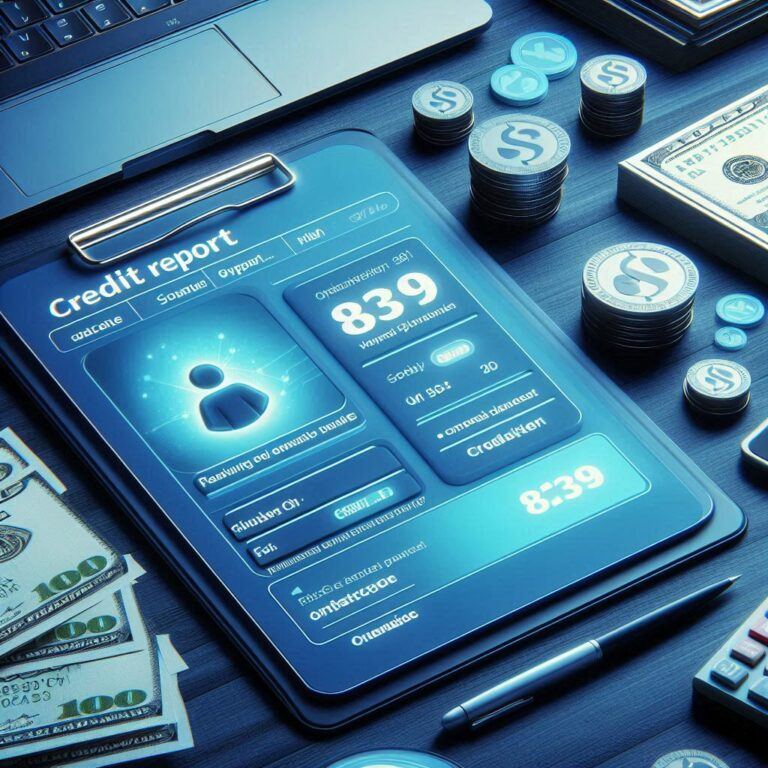What Is A Good Credit Score? Is 618 A Good Score?

What is a Credit Score and Why Does it Matter?
In the world of modern finance where the classic mantra “cash rules everything around me” (C.R.E.A.M) has evolved into a new reality: “credit rules everything around me.” Your credit score is like your financial report card—it’s more than just a number; it’s a key that can unlock or lock doors to various opportunities. Yeah, it sounds intense, but don’t stress, you’ve got this.
The FICO Score
So, what’s in a credit score anyway? It’s a magic number between 300 and 850 that tells potential lenders how risky it is to lend you funds. The higher, the better! Think of it like a high score in a video game – the closer you get to 850, the more points you’re nabbing for trustworthiness.
Ever heard of the FICO score? That’s the big cheese of credit scores. The Fair Isaac Corporation created it, and it’s kinda like the standard. Your FICO score is based on several factors. Key players here include your payment history, the amount you owe, the length of your credit history, any new credit you’ve got, and the variety of credit types you’re using.
When folks talk about credit scores, FICO is usually what they mean. But not all scores are created equal, since the different parts that make up your score make some lenders look at you differently. This is where it gets interesting and a bit strategic! Navigating these numbers can get confusing, but understanding the basics gives you a solid grip on where you stand.
Decoding the FICO Score Ranges
Navigating through the vast array of credit scores can be tricky, but once you know the boundaries, it gets a lot clearer. Each range tells a story about your financial reliability, kind of like different levels in a game. Let’s break it down.
In the FICO world, the top dogs are those scoring from 800 to 850. That’s what we call ‘Excellent.‘ With this score, you’re the cream of the crop, the envy of every borrower. Lenders practically roll out the red carpet for you, offering the best interest rates and loan terms.
Next, we’ve got ‘Very Good’, which sits between 740 and 799. You’re still in a great spot here, with pretty favorable conditions when borrowing. Lenders see you as a reliable contender, even if you’re not the highest scorer.
Then there’s the ‘Good’ range, between 670 and 739. While this isn’t the prestige of a top-notch score, you can still expect reasonable offers from lenders. You’re solid, just not spectacular.
Drop a little lower to 580 through 669, and you’re in the ‘Fair’ category. It tells lenders that you’re more of a risk. You might snag a loan, but it might cost more in terms of interest rates.
And finally, anything below 580 lands you in the ‘Poor’ bracket. Here, borrowing can become costly and challenging. It’s like being in the underdog position, but with dedication, you can work towards a comeback.
Understanding where you stand in these ranges is your first step towards strategic planning. Aim higher, and you’ll unlock better opportunities, proving that with credit knowledge, you’re equipped for a financial win.
Is 618 a Good Credit Score?
Seeing a 618 on your credit report might make you feel like you’re stuck in the gray zone, and it can be a bit of a bummer. Let’s break it down. According to FICO score ranges, 618 places you in the ‘Fair’ category. While it’s not rock bottom, it’s not what you’d call solid either. Lenders see it as a sign that there might be some risk in lending you money.
So what does this mean for you? It means you might still find lenders willing to work with you, but the interest rates could be steeper than what someone with a higher score would get.
You can likely qualify for basic credit cards (especially secured ones), car loans, and some personal loans, though terms won’t be the most competitive. Insurance premiums might be slightly higher, and you may need to put down deposits on things like cell phone plans or utility accounts. The key is to shop smart and avoid high-interest traps like predatory lenders or subprime credit offers. With consistent progress, that 618 can turn into a 700+ sooner than you think.
The good news? A 618 score isn’t the end. It’s an opportunity for growth! With some effort, you can definitely build it up. Treat it as your baseline and make it your goal to climb into the ‘Good’ range. Start by making sure you pay bills on time, reducing any existing debts, and keeping a close tab on your credit report for errors that might be dragging you down. If you find errors take a look at my blog post on How to Dispute Errors on your Credit Report for a step by step guide to getting these resolved.
Can You Buy a House with a 618 Credit Score?
Yes, you can buy a house with a 618 credit score, but it comes with a few caveats. Most conventional mortgage lenders prefer scores of at least 620–640, but FHA loans are more flexible, allowing approvals for credit scores as low as 580. The tradeoff? You may need to provide a higher down payment and be prepared for higher interest rates.
Think of it like getting into the concert, but not snagging front-row seats just yet. Still, if you have steady income, low debt-to-income ratio, and enough saved up, homeownership is within reach. Just be sure you’re budgeting for those extra costs. Before house-hunting, take a few months to improve your score even a 20-point bump could save you thousands over the life of a loan.
Why a Higher Credit Score Matters
Improving your credit rating from 618 can open up a world of financial benefits:
1. Better Loan Terms: A higher credit score often means lower interest rates on personal loans, a car loan or a mortgage, helping you save money in the long run.
2. Increased Credit Card Offers: With a better score, you’ll have access to higher credit limits and cards with better rewards and perks.
3. Enhanced Financial Security: A good credit score provides peace of mind, knowing you have access to favorable financial options when needed.
But it doesn’t stop there. A high score can influence your daily life more than you’d think. Renting an apartment? Landlords often check your credit. A good score could be your ticket to finding better living conditions. Buying insurance? That score comes up again, potentially lowering your premiums and saving you serious cash in the process.
Some employers might even peek at your credit when you’re job hunting. They see it as a measure of responsibility, so a solid score can help you snag that dream gig.
Think of your credit score as a financial passport. It’s not just about buying power; it’s about saving money and opening up opportunities that make life better at every turn. High scores equal less stress and more freedom to make the best choices for yourself. So, aim high and watch the benefits roll in.

Strategies for Improving Your Credit Score
1. Payment History: The Foundation of Your Credit
Your payment history is a cornerstone of your credit score. Timely payments demonstrate financial responsibility and reliability.
- How to Catch Up on Missed Payments: If you’ve fallen behind, make a plan to bring your accounts current. Budget wisely and consider setting up automatic payments to avoid future late payments.
- Avoid Future Misses: Use budgeting apps or calendar reminders to keep track of your bills. Consistent, on-time payments will gradually improve your score.
2. Credit Utilization: Managing Your Balances
- Credit utilization is the ratio of your credit card balances to your credit limits. Aim to keep this ratio below 30% to maintain a healthy score.
- Reducing Credit Card Balances: Focus on paying down high-interest credit cards first. If possible, make extra payments to reduce your balance more quickly.
- Maintaining Low Balances: Avoid carrying large balances. Paying off your credit card balance in full each month is ideal.
3. Credit History: Lengthening Through Responsible Use
- The length of your credit history contributes to 15% of your credit score. A longer history reflects stability and responsible credit use.
- Building Your Credit History: Keep older accounts open to maintain a longer credit history. Manage new credit accounts responsibly to build your credit profile over time.
- Be Patient: Building a robust credit history takes time, so start early and practice patience.
4. Types of Credit: Diversifying Your Accounts
- Having a solid credit mix—like revolving credit and installment loans—can positively impact your score.
- Responsible Diversification: If you only have credit cards, consider responsibly taking on different types of credit, like a small personal loan, to diversify your credit mix.
- Monitor Your Accounts: Regularly check your credit report to ensure all accounts are accurately reported and managed.
5. Recent Inquiries: Limiting New Credit Checks Each new credit application results in a hard inquiry on your report. While a few inquiries are fine, too many in a short period can hurt your score.
- Minimize New Inquiries: Apply for new credit only when necessary. If you’re shopping for a loan, try to do so within a short period to limit the impact of multiple inquiries. Its a good idea to plan ahead.
- Be Proactive: Do not wait until the last minute to try and secure a loan or credit card. Sometimes the decisioning process may take longer than anticipated or the receipt of a card in the mail or even plan to transfer funds to a different account. Being proactive will help reduce stress. Try to secure your funds before the emergency occurs that way you are able to navigate hardship with one less thing to worry about.
- Check Your Credit Report: Regularly review your credit report for any unauthorized inquiries and address them promptly.
Tools and Resources for Credit Improvement
Navigating credit improvement is way easier when you have the right gear by your side. There’s an impressive array of tools and resources out there to help keep your score on the up and up.
Credit monitoring apps are super handy. They keep an eye on your credit report and alert you to changes or weird activity. Some popular picks include Credit Karma and Experian. I’ve used Credit Karma for years and just recently started using Experian to keep a closer watch on my credit and Identity. They even provide personalized advice on boosting your score.
If you’re feeling lost, consider reaching out to a financial counselor. They’re like having a coach in your corner, providing expert guidance and crafting personalized plans to tackle your unique credit challenges. We offer amazing financial counseling and support at Transforming Finances. Take a moment to view our website and set up a free consultation with us.
Don’t overlook resources offered by the big three credit bureaus – Equifax, Experian, and TransUnion. They not only provide your credit reports but often offer educational tools, credit score simulators, and personalized tips.
Credit unions or community banks can be cool alternatives, too. They often have credit-building programs and other resources to help you understand and improve your credit.
By diving into these tools, you get more than just numbers. You gain insights, learning what’s working and what needs more elbow grease. With these resources, you’re not just a spectator but an active player in managing and enhancing your credit journey.

The Bright Side of Improving Your Credit Score
Improving your credit score isn’t just about crunching numbers—it’s about transforming your financial future. A good credit score pays off in more ways than one, and it starts by turning challenges into triumphs.
The long-term impact of boosting your score is huge. With better rates on loans and credit cards, you get to hold onto more of your hard-earned cash. It’s like putting money back into your pocket every month, which feels pretty stellar.
Credit score success stories abound, with folks moving from financial setbacks to glowing prospects. These real-world victories show that raising a score is achievable, no matter where you start. Hearing how others have hit milestones can light a fire under your own efforts. I am one of those individuals. I started working on my credit score years ago.
Besides loans and interest rates, a good credit score can give you peace of mind and a sense of achievement. You’ll experience less financial stress and gain more freedom to pursue your personal goals, knowing you’ve set yourself up for success.
Every positive change in your credit brings future confidence and brighter opportunities. You hold the power to shape your financial success, and that’s some seriously good news for your journey ahead.
Final Thoughts
Evaluate your own credit score using reputable sources to understand your financial standing. Explore resources like eBooks or consultations for personalized financial advice tailored to improving your creditworthiness. Consider investing in my eBook, “Rewrite Your Money Story,” which integrates biblical teachings with practical financial advice to help you navigate financial decisions faithfully.
As a financial steward, commit to managing your finances in a way that honors God and serves your long-term financial well-being. Schedule a Complimentary 1:1 consultation with me to discuss personalized strategies for enhancing your creditworthiness and achieving your financial goals. Taking the first step towards a brighter financial future today by embracing faith-based financial principles and seeking guidance to transform your financial story are steps in the right direction.
“Have you ever tried applying for something with a fair credit score? What was your experience like? Drop a comment below I’d love to hear your story!
Disclaimer:
The information provided in this post is based on my experience and research in personal finance. While I strive to share accurate and helpful insights, this content is for informational purposes only and should not be considered professional financial advice. Please consult a qualified financial advisor for advice tailored to your specific situation.







Dear Leah,
As I read your article, I would like to express my appreciation for the clarity and warmth with which you addressed this often intimidating topic.
The analysis of FICO score ranges was particularly enlightening. Before reading your article, I had a vague understanding of what constituted a “good” or “bad” credit score, but your detailed explanation provided a clear picture of where a score of 618 falls. This demystification is empowering, especially for those of us trying to improve our financial health.
Your emphasis on actionable steps, such as paying bills on time and reducing debt, is both practical and encouraging. However, I found myself curious about the impact of credit mix on one’s score. Could you perhaps elaborate on how different types of credit (such as installment loans vs. revolving credit) affect our results?
In your experience, how often should someone check their credit report, and are there any specific services you recommend for this purpose?
Thank you for shedding light on this crucial topic. Your accessible writing style makes financial literacy accessible, and I look forward to reading more of your insights in the future.
Best regards,
Mitia
Thank you for your feedback. You have some great questions in your post and I will address one of them now. You asked how often should someone check their credit report?
I believe it is good to review at least once a month. That is because their is fraud and identity theft that can occur and the faster you are aware of the fraud the sooner you are able to stop it. There are also some great credit monitoring companies. Experian offers a great program that provides you with updates and alerts about new activity or changes in your score. You are able to request a free credit report yearly so that you can review it for accuracy. If you don’t plan to make any large purchases in the near future I would consider locking my credit which would serve as a way to protect your credit from fraudsters.
Your other question regarding credit mix I would like to do more research on before providing an answer possibly in a blog post. I hope this helps.